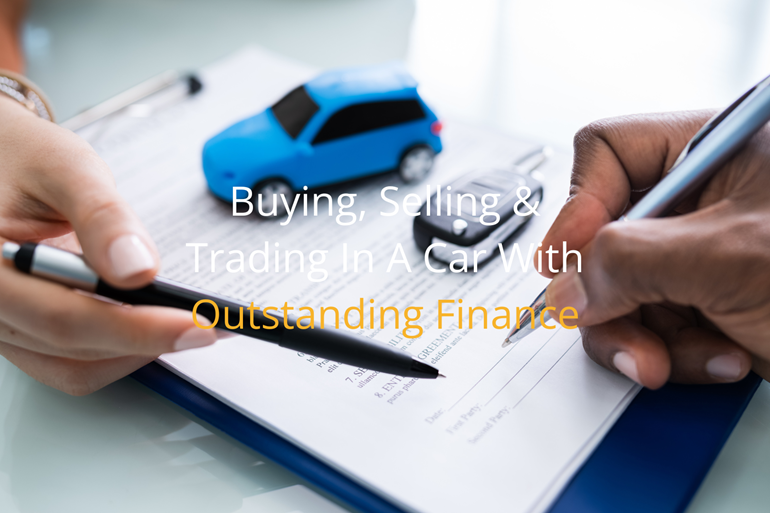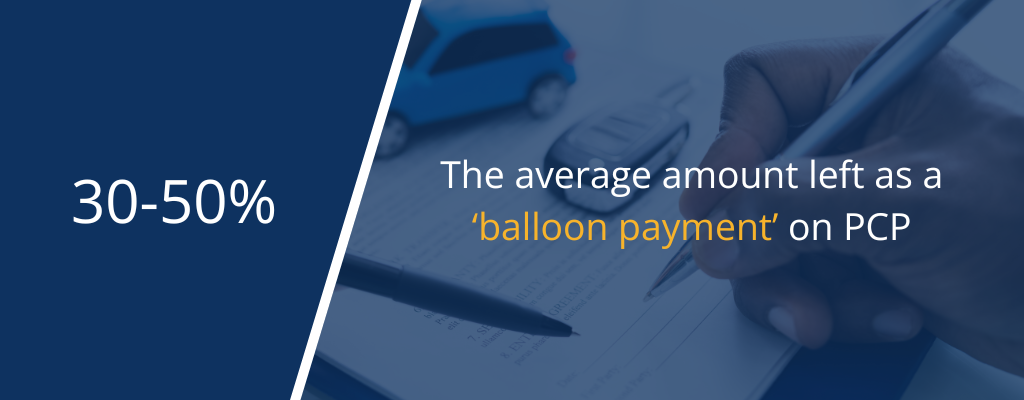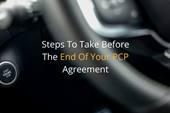
Buying, Selling & Trading In A Car With Outstanding Finance
Dealing With A Financed Car, Buying, Selling Or Trading In, It Pays To Understand Your Rights And Responsibilities.
Quick Links
- 1 Minute Read
- Introduction
- Why Would You Be Refused Car Finance?
- What About Negative Equity?
- Buying, Selling & Trading In A Car With Outstanding Finance
- What Is Outstanding Finance?
- Can You Sell A Car With Outstanding Finance?
- What If You're Buying A Car With Outstanding Finance?
- Trading In A Car With Outstanding Finance
- What About PCP Agreements Nearing The End?
- Watch Out For Voluntary Termination Misconceptions
- So, What's The Safest Way Forward?
- Final Thoughts
1 Minute Read
A car with outstanding finance can be risky if you don’t understand your rights. If a car still has finance, it legally belongs to the lender not the driver and selling it without clearing the debt can land you in legal trouble. Always get a settlement figure from your finance company before selling or trading in.
For buyers, do a finance check before handing over money especially in private sales. If you buy a car with outstanding finance, the lender can repossess it.
Negative equity (owing more than the car’s worth) can complicate things, especially in trade-ins or if the car is written off. Gap insurance and timing your finance decisions wisely can help.
At the end of a PCP deal, you can return, keep, or trade the car. Just don’t fall for voluntary termination myths you must have paid 50% of the total finance first.
Bottom line: Be honest, check before you act, and always involve your finance provider. It’s the safest route.
Introduction
If you’ve ever looked into buying or selling a second-hand car, you’ve probably come across the term “outstanding finance.”
Like most people, we’re guessing you’ve wondered, can I actually sell or buy a car that still has finance on it? Is it even legal? And what happens if I trade one in with finance still left to pay?
The whole subject of outstanding finance can be a little grey, with some pretty big financial (and possibly legal) consequences if you get it wrong. In this guide, we’re clearing everything up, so you’ll know exactly where you stand when it comes to buying, selling or part-exchanging a car that still has some finance left to pay.
First though, let’s look at a few of the car finance basics.
Why Would You Be Refused Car Finance?
There are a number of reasons why you may have your car finance application rejected.
Typically, these include a low or poor credit rating, income level, employment status and history as well as your previous credit history such as the amount of debt you currently hold, your repayment history and any defaults, late payments or CCJ’s against your name.
If you have a credit application declined you’ll often be given some contact details for the finance provider (assuming you’re buying a car and the seller is working with a third party finance company). You can contact them to discuss in further detail why your application was declined.
Remember, too many credit applications in a short period of time, as well as many failed applications can have an adverse effect on your credit score.
What About Negative Equity?
Negative equity can occur when you finance a vehicle. Essentially, negative equity means you owe more on finance than the car is worth, which can happen if your repayments don’t keep up with the amount of depreciation your car experiences.
Let’s say you have a new £30,000 Ford on a three year HP deal, financing the whole amount of the car. In the first year, you pay off 20% of the car’s value (That’s £6,000). However, in that same time, your car has depreciated by 30%, meaning it’s valued at £21,000, leaving you with a negative equity of £3,000.
In this example, you’d still owe £24,000, but your asset (the car) is only worth £21,000.
Negative equity isn’t really an issue if you own the car a while and there are no issues. However, it can cause problems if;
- You come to sell the car: If you come to sell your car and it has negative equity, you’ll need to cover the amount you owe before you can hand the car back or trade it in.
- You have an accident, fire, theft or ‘write off’: If your car is written off, the insurer will give you a settlement figure for the value of the car now. That could be massively different from the amount you owe, if you’re in negative equity. Gap insurance can help alleviate this pressure, as it covers the difference, meaning you’re not out of pocket.
Read More: Should You Buy Your Next Car New Or Used?
Buying, Selling & Trading In A Car With Outstanding Finance
What Is Outstanding Finance?
Put simply, a car with outstanding finance still belongs to the finance company; not to the person driving it. Whether it’s on a PCP (Personal Contract Purchase) or HP (Hire Purchase) agreement, you’re technically just “renting” the car until all payments (including any final balloon payment) are made.
In contrast, with a personal loan, the vehicle usually belongs to the borrower straight away; because they’ve paid the seller in full and owe the bank or lender instead.
So, if you’re thinking about buying or selling a car with outstanding finance, you’ll need to tread carefully.
Can You Sell A Car With Outstanding Finance?
Here’s the simple answer: No; you can’t legally sell a car that has outstanding finance, unless you clear the debt first or get permission from the finance company.
The car isn’t yours to sell until the finance is paid off. Trying to pass it on while there’s money owed can land you in serious legal hot water under the Sale of Goods Act 1979 and even Theft Act 1968, if there's intent to deceive.
That said, finance companies aren’t monsters. If you contact them, most will give you a “settlement figure”; the amount you’d need to pay to end the agreement early and take ownership of the vehicle. Once you’ve done that, you can legally sell or trade it in.
Read More: How To Sell Your Used Car
What If You're Buying A Car With Outstanding Finance?
This one’s a bit tricky. If you buy a car privately and it turns out there’s outstanding finance on it, you risk losing both the car and your money. That’s because the finance company can still repossess the vehicle; it was never the seller’s to pass on.
This is why HPI checks and vehicle history reports are so important. Use a reputable service like Total Car Check or CarVertical to see if any finance is owed on a vehicle before you buy.
If you’re buying from a dealer, you’re usually protected. Reputable dealers will ensure all finance is cleared before they sell a car. Still, it's always worth asking for written confirmation.
A Few Things To Remember
- Any car that’s financed is still legally owned by the finance company.
- Any car that has outstanding finance that isn’t paid could be at risk of repossession.
- Do not agree to pay a private seller the full amount on the provision they cover the finance. This leaves you at severe financial risk with little protection.
Trading In A Car With Outstanding Finance
Trading in a car that’s still under finance is possible; and actually quite common. Here’s how it usually works:
- The dealer will contact your finance provider and request a settlement figure.
- They’ll then value your car.
- If your car is worth more than the settlement figure (positive equity), the difference can be used as a deposit on your next car.
- If it’s worth less (negative equity), you’ll need to pay the shortfall; or roll it into your new finance deal (though this can cost more in the long run).
This kind of trade-in is easiest with HP and PCP finance. With a PCP, if you're nearing the end of your agreement, you also have the Voluntary Termination or Voluntary Surrender options under the Consumer Credit Act; which can be worth exploring if you’re struggling.
What About PCP Agreements Nearing the End?
If your PCP agreement is nearly up, you’ve usually got three main options:
- Return the car and walk away (as long as mileage and condition terms are met).
- Pay the balloon payment and keep the car.
- Trade it in and use any positive equity towards a new vehicle.
Timing is everything here. Knowing your balloon payment and the current market value of your car helps you decide which option makes financial sense. You can check your car’s market value via trusted sites like Auto Trader.
Many PCP finance providers and dealerships will offer an incentive to ‘stick with them’, meaning you could get some good deposit contributions towards your next car if you decide to get another PCP deal.
Usually if there are any offers available, the dealership you bought your current car from will contact you in advance.
Read More: Should You Buy, Return Or Upgrade At The End Of Your PCP Deal?

Optional Final Payments or 'Balloon Payments' need to be paid before a car can be sold.
Watch Out For Voluntary Termination Misconceptions
A lot of drivers hear the term “Voluntary Termination” and assume it means they can just hand back the car at any point. Not quite.
You can only voluntarily terminate a finance agreement after you've paid off at least 50% of the total finance amount (including interest and fees). If you haven’t reached that point, you’ll need to top it up.
It’s a legal right; but not something lenders are thrilled about. Be prepared to follow the process carefully and document everything.
So, What’s The Safest Way Forward?
Whether you’re buying, selling, or trading in, the safest move is to be upfront with everyone involved:
- Sellers: Always settle the finance first, or involve the finance company directly.
- Buyers: Always run a finance check before handing over any money.
- Dealers: Work with reputable dealers who can manage the process with transparency and documentation.
And whatever you do, don’t ignore the finance and hope no one notices. It doesn’t go away; and it can cost you far more than expected if handled badly.
Final Thoughts
Cars and finance are deeply entwined these days, and it’s not uncommon to find yourself trying to move on from a vehicle before the agreement has ended. The good news is, there are legal, safe, and fairly straightforward ways to buy, sell, or trade in cars with outstanding finance; you just need to know how.
Stay informed, speak to your finance provider early, and always check before you act. You’ll thank yourself later.
We hope this guide clears a few things up for you. If there’s anything you think we’ve missed, please let us know. And, as always, don’t forget to share this with your friends using social media!
Pin It!













